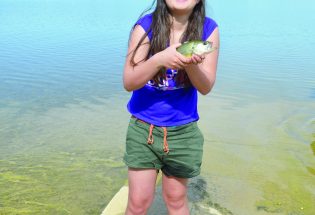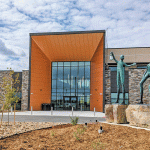News Bites – January 27, 2022
*Total COVID-19 Cases: 68,528 (+4,550)
Total Cases in Berthoud: 3,072 (+161)
Deaths in Larimer County: 429 (+4)
7-day case rate per 100k: 1,255 (-20)
Hospital Utilization: 80%
ICU Utilization: 108%
7-Day test positivity rate: 28.4%
Risk Score: High
COVID patients in hospital: 103 (+13)
17.32% of the population of Larimer County has been reported to have contracted the virus. Deaths attributed to the virus comprise 0.66% of reported cases. Of reported deaths, 24% were age 75 to 84, 21% were 65-74 and 38% were 85 and older. Twenty-seven people in the county between the ages of 18-54 have died.
As of Monday, Jan. 24, there have been 606,457 doses of the vaccines administered in Larimer County. 78.3% of eligible county residents have received at least one dose of the vaccine.
*Case data as of Wednesday.
+++++++++++++++++++
Gov. Jared Polis has proclaimed January 2022, National Radon Action Month, and the Colorado Department of Public Health & Environment urges Colorado residents to test their homes for radon using a low-cost radon test kit available by visiting sosradon.org/test-kits or by calling 1-800-767-7236.
Radon is the leading cause of lung cancer deaths among nonsmokers in America and claims the lives of about 21,000 Americans each year. In Colorado, nearly half of homes have high radon levels, and more than 500 lung cancer deaths in the state each year are attributed to radon. The best way to protect against radon is to perform a simple, low-cost test of your home. Kits cost as little as $17 and the state of Colorado offers low-income mitigation assistance if radon is detected.
Radon is a naturally occurring radioactive gas with no color, odor, or taste. Radon can easily enter homes and other buildings through small openings like cracks in foundations, openings around pumps and drains, and crawl spaces.
“Testing your home for radon is simple and should be done when all your doors and windows are closed. That’s why January is a great time to test, during National Radon Action Month.” said Jill Hunsaker Ryan, executive director, CDPHE.
Homeowners who already have radon mitigation systems should retest their homes every few years to make sure the system is working properly. More information is available on the CDPHE website at coloradoradon.info.
+++++++++++++++++++++
Aims Community College is continuing its fourteenth year with the Tax Help Colorado program. This program offers free tax help by IRS certified student and community volunteers. The program at Aims has grown to serve nearly 1,500 taxpayers per year. Taxpayers who earn up to $58,000 gross annually are eligible for help preparing and electronically filing their federal and state tax returns at the Aims Community College campuses in Greeley, Fort Lupton, and Loveland.
For more information, visit aims.co/tax-help.
++++++++++++++++++++++
Congressman Joe Neguse, Chair of the U.S. Subcommittee on National Parks, Forests and Public Lands, succeeded in passing legislation through the House Natural Resources Committee that would complete the Continental Divide Trail. Introduced by Neguse in August, The Continental Divide Trail Completion Act directs the U.S. Forest Service and the Bureau of Land Management to work together to finish the 3,100-mile Continental Divide National Scenic Trail by its 50th anniversary in 2028.
“I am glad to see my proposal to complete the CDT pass Committee today, and I look forward to bringing it to the House floor to fulfill a promise Congress made more than four decades ago,” said Neguse.
Congress created the CDT in 1978 as part of the National Trails System, a network which spans all 50 states. The CDT is the highest, most challenging, and most remote of 11 National Scenic Trails, running along the Continental Divide through Montana, Idaho, Wyoming, Colorado, and New Mexico. 230 miles—7.5% of the entire trail—traverses Colorado’s 2nd District. The trail’s corridor helps protect the headwaters of the Colorado, Rio Grande, Columbia, and Mississippi Rivers.
More than 40 years after its creation, the Continental Divide Trail remains incomplete due to gaps in public lands along more than 160 miles of its route. In these areas, the CDT is forced to follow along roads to connect one completed section to another. When the trail is complete, it will connect an unbroken corridor of more than 2 million acres of public land for wildlife to safely traverse along their migration routes. It will also expand access to the outdoors by offering more opportunities to thru-hikers and would boost rural economies, known as gateway communities, that run along the trail.
++++++++++++++++++++++
The Federal Emergency Management Agency (FEMA) has approved more than $237.12 million in additional Public Assistance funding for the COVID-19 response in Colorado. The assistance was made available under a major disaster declaration issued March 28, 2020. FEMA has provided more than $1.8 billion in total assistance for Colorado’s COVID-19 response to date.
The Colorado Department of Public Health and Environment was awarded $237.12 million in FEMA funding to create and operate seven community-based testing sites to conduct statewide COVID-19 testing. Since September 2021, an average of more than 450,000 tests per month were administered at the sites. The award provides funding for contracted testing and lab services including supplies and equipment, and the transporting and processing of tests.
For the COVID-19 response, FEMA has simplified the Public Assistance application and funding process to address the magnitude of this event and to allow state and local governments to receive eligible funding more quickly. Additional information about FEMA’s Public Assistance program can be found at fema.gov/assistance/public.
++++++++++++++++++++++
Rocky Mountain National Park is moving to a new wilderness backcountry camping permit reservation system this year. Beginning March 2, 2022, at 8 a.m. Mountain Time, Rocky Mountain National Park overnight wilderness backpacking camping permits will be available for purchase at Recreation.gov. Through the new system, customers will be able to view permit availability, book a reservation, and pay online. Phone, mail, email and fax reservations are not accepted. There will not be any in-person Wilderness Campsite reservations taken at park Wilderness Offices from March 1, through April 3, for summer wilderness backpacking camping trips from May 1 through October 31.
Permits are required for all overnight camping in Rocky Mountain National Park. The recreation.gov site is currently visible to the public. Become familiar with the site prior to March 2, when reservations go live. To be prepared, those interested in booking a wilderness camping trip this summer should set up an account with Recreation.gov in advance of March 2.
This page includes important links to detailed information about Rocky Mountain National Park’s wilderness backcountry camping, including camping regulations, trail descriptions and maps. Beginning March 2, when reservations can be booked, search “Check Availability” to book small groups (1-7 people) and large groups (8-12 people). This specific feature will not be active until March 2. Be sure to review the map to determine what campsites to book and read through all the available information about Wilderness regulations and trail descriptions. Additional information with links is also located at nps.gov/romo/planyourvisit/wilderness-camping.htm.
Starting at 8 a.m. on March 2, wilderness backcountry camping permits will be available for May 1 through October 31, 2022. There is a $36 non-refundable administrative fee, for reservations from May 1 to October 31 and a $10 non-refundable administrative fee from November 1 to April 30 for each camping permit reserved.
Permits will need to be picked up at the park’s Wilderness Offices to activate the reservation. Staff and volunteers in the park’s wilderness office provide trip planning advice and information for a safe and enjoyable trip into the wilderness. Requirements for food storage necessary to protect bears and other wildlife, mountain weather, hazards, and Leave No Trace ethics are among the information received during the permitting process.
+++++++++++++
- June, 15 2017

Berthoud Sportsman’s Club hosts...
By Amber McIver-Traywick The Surveyor For many people fishing is a relaxing pastime. You can...
- June, 11 2020

Larimer County Fair is on for August ...
Courtesy photo - Logann Caudill (12) with her horse at fair last year. By Katie...
- September, 27 2019

“Noodle King” continues t...
Courtesy photo - Bob Lebsack making noodles in the United Methodist Church. By Amber McIver-Traywick...
- May, 06 2019

TSD hears requests to help fund Berth...
By Dan Karpiel The Surveyor The Thompson School District (TSD) Board of Education (BOE) tackled...
- May, 17 2019

Veteran’s Corner
By Ryan Armagost The Surveyor This month we celebrate Memorial Day by mourning and honoring...
- March, 17 2022

Golden Growls rescues overlooked seni...
Golden Growls Senior Rescue fosters and rescues dogs that have a few years on them...

Snowpack at 119% above normal
Community News

Karspeck to serve third term as Berthoud mayor
Community News

OPINION – No bitchin’ allowed
Community News
Roy Tripi to become principal of BHS on July 1
Community News
Berthoud Sports Hall of Fame announces 2024 inductees
Community News
Girls helping girls: a compassionate Girl Scout project
Community News
Longview Campus served 1,000-plus since opening
Community News
COMMUNITY CALENDAR:
Community Calendar – add an event
Homestead Fine Art Gallery First Fridays OPEN HOUSE
03 May 4:00 PM - 7:00 PM
Homestead Fine Art Gallery First Fridays OPEN HOUSE
07 Jun 4:00 PM - 7:00 PM
Homestead Fine Art Gallery First Fridays OPEN HOUSE
05 Jul 4:00 PM - 7:00 PM
Homestead Fine Art Gallery First Fridays OPEN HOUSE
02 Aug 4:00 PM - 7:00 PM
Homestead Fine Art Gallery First Fridays OPEN HOUSE
06 Sep 4:00 PM - 7:00 PM
Homestead Fine Art Gallery First Fridays OPEN HOUSE
04 Oct 4:00 PM - 7:00 PM

